(Disclosure: Some of the links below may be affiliate links) When you want to invest in the stock market, you need a broker account. And many Swiss investors only feel comfortable having a broker from Switzerland, or at least a broker with an office in Switzerland. So, we need to compare these Swiss brokers and see which one is the best to invest in the stock market for a Swiss investor. In this article, I will compare five Swiss brokers with different scenarios and see which one is the best (the cheapest!). What makes the best Swiss broker? Swiss brokers are extremely similar. They are all regulated in the same way, and most of them have the same features. What matters most in choosing the best Swiss broker is the price! Some people will argue that we also need to look at their tools
Topics:
Mr. The Poor Swiss considers the following as important: Investing
This could be interesting, too:
Lance Roberts writes CAPE-5: A Different Measure Of Valuation
Lance Roberts writes CAPE-5: A Different Measure Of Valuation
Lance Roberts writes Estimates By Analysts Have Gone Parabolic
Lance Roberts writes The Impact Of Tariffs Is Not As Bearish As Predicted
(Disclosure: Some of the links below may be affiliate links)
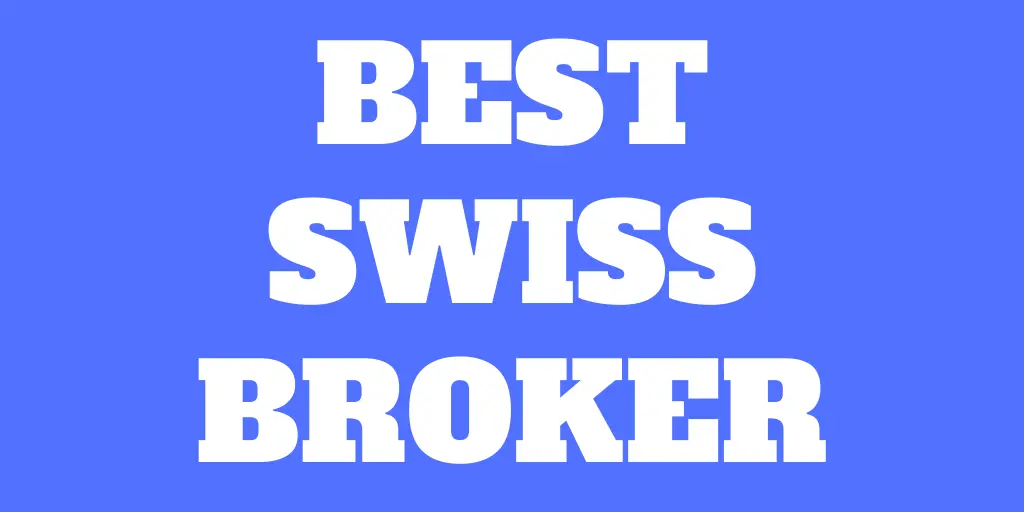
When you want to invest in the stock market, you need a broker account. And many Swiss investors only feel comfortable having a broker from Switzerland, or at least a broker with an office in Switzerland.
So, we need to compare these Swiss brokers and see which one is the best to invest in the stock market for a Swiss investor.
In this article, I will compare five Swiss brokers with different scenarios and see which one is the best (the cheapest!).
What makes the best Swiss broker?
Swiss brokers are extremely similar. They are all regulated in the same way, and most of them have the same features. What matters most in choosing the best Swiss broker is the price!
Some people will argue that we also need to look at their tools and reporting capability. But I do not think this is a criterion. For a passive investor, you need to be able to buy shares of ETFs. It does not matter how shiny the graphs of your net worth are or how many possible algorithms you can use for active trading. What matters is to minimize the price you are going to pay for your transactions.
I spend less than 10 minutes a month on my broker account. I do not really care how beautiful or how easy it is. I want to be able to buy the ETFs from my portfolio at a low cost.
The other thing that matters is that the broker gives you access to the stock exchanges we need. In the case of a Swiss broker, we need at least access to the Swiss stock exchange. We also need access to the major European Stock Exchanges. Ideally, we want access to U.S. ETFs as well. Unfortunately, not all Swiss brokers still give you this access.
Even without U.S. ETFs, it would be great to have access to the major U.S. stock exchanges. Although passive investing is the way to go for most people, many investors still want access to American companies.
So, I am going to compare some Swiss brokers over different scenarios. And for each scenario, we are going to see which one is the cheapest. This article is not meant to be a review of these brokers.
Some Swiss Brokers
I have selected six Swiss brokers for this comparison:
- Swissquote, an online broker.
- PostFinance, the Swiss Post Bank.
- Saxo Bank, an investment with a branch in Switzerland.
- CornerTrader, an online broker.
- Migros Bank, the bank from Migros.
These are brokers that many people are using in Switzerland. And they are the cheapest brokers that I was able to find.
CornerTrader has two different accounts that are useful for passive investors: Private and Capital. Capital is cheaper than Private and only requires you to have 75’000 CHF on your account. So, I will compare the fees for these two accounts.
Saxo also has several account types, and it depends on the trading volume. Unfortunately, it is not clear how much trading volume is necessary. So, I am going to assume we are using the Saxo Classic account.
I also wanted to include Strateo into the list since it is fairly priced. Unfortunately, it has been bought by Saxo Bank. Interestingly, Saxo Bank is significantly more expensive than Strateo. So, instead of lowering their prices, Swiss Banks are buying cheaper competitors. This should give you an idea of how little they care about their customers.
All of these brokers give you access to many stock exchanges. You will have to pay the Swiss Stamp Tax Duty with all Swiss brokers, so we will ignore it in our comparisons because it would be the same anyway.
I will start by comparing several individual fees of each broker. And then, I will run through some scenarios to see more in detail which is best.
Custody Fees
First, we are going to look at the custody fees of these brokers. A custody fee is something you are going to pay just for keeping your account open. Often, the custody fee is expressed as a percentage of the value of your portfolio. Also, there is often a minimum and sometimes a maximum on these fees.
The custody fee is significant to consider because you will pay it as long as you have an account. If you plan to retire on your portfolio, a large custody fee will make it more difficult during the accumulation and withdrawal phases.
Here are the custody fees of our five brokers:
- Swissquote has a 0.025% quarterly fee, with a min of 15 CHF and a maximum of 50 CHF.
- PostFinance has a 90 CHF per year custody fee. But users can use this as trading credits, so this is both an inactivity fee and a custody fee.
- Saxo Bank has a 0.18% per year custody fee, paid monthly, with a monthly minimum of 5 CHF.
- CornerTrader has no custody fees.
- Migros has a 0.23% custody fee below 750K, 0.21% until 1.5M and 0.19% after that, and a yearly minimum of 50 CHF.
Here are the custody fees you would pay with these brokers:
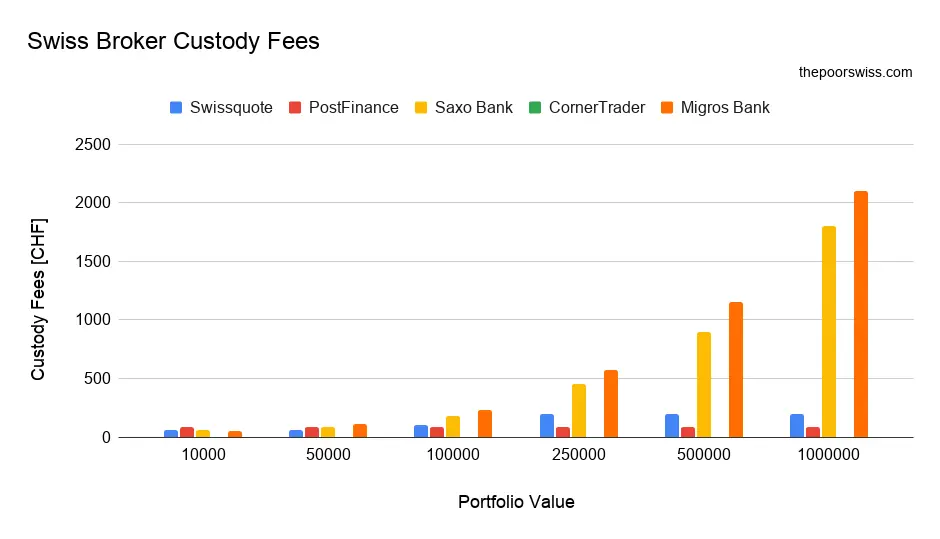
From this chart, the conclusion should be fairly obvious. Neither Saxo Bank nor Migros Bank looks to be a good fit for a Swiss investor. To manage a one million CHF portfolio with Saxo Bank, you would pay 1800 CHF per year, and with Migros Bank, you would pay 2100 CHF per year! This is bad.
In comparison, all the other brokers are pretty good on that note. To see better, here is the same graph without Saxo Bank and Migros Bank:
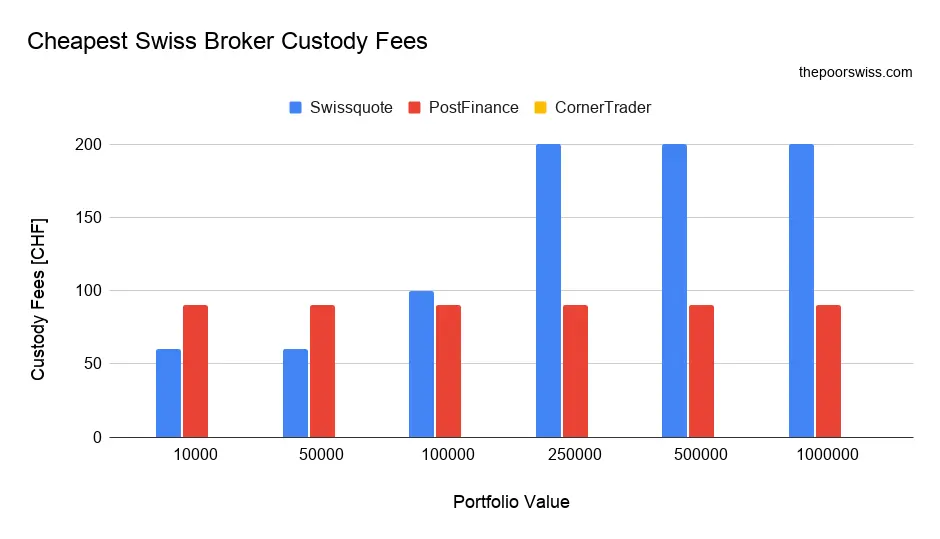
The best is always CornerTrader since they have no custody fees. And the worst is Swissquote because they have the highest maximum. But to me, they all look acceptable.
Inactivity Fee
The second fee we need to look at is the inactivity fee. Some brokers charge a fee when you do not do any action on your account during a certain period of time. It is very close to a custody fee, but it is only charged when you do not use your account.
This fee is not as important as the custody fee since you will not pay it during the accumulation phase. But if you plan to retire on your portfolio, it is still important because you will pay it during your entire retirement.
Out of the five brokers, only two of them have inactivity fees. Saxo Bank charges 89 CHF per quarter without trade. And CornerTrader charges 35 CHF per quarter without trade.
Here is the yearly inactivity fee for each of the Swiss brokers:
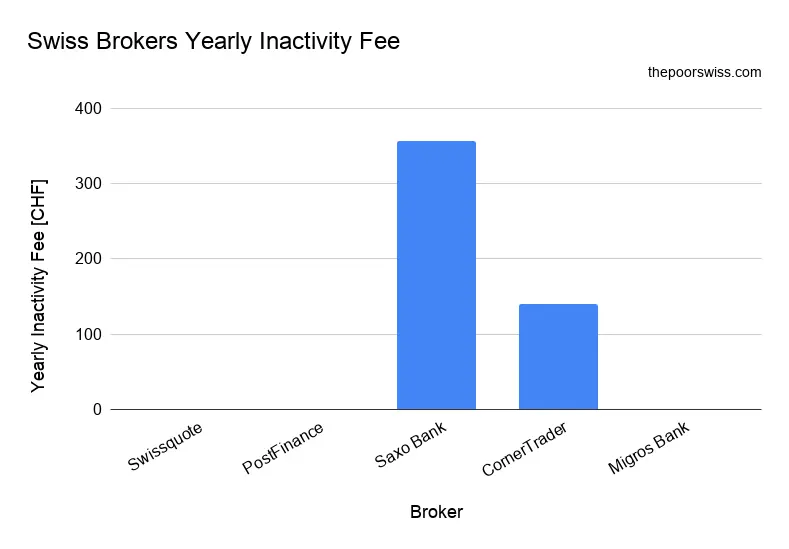
Once again, Saxo Bank is pretty bad, with more than 300 CHF per year of inactivity fee. CornerTrader had no custody fees, but their inactivity fees are significant. This is why it is important to always consider everything. All the other brokers have no inactivity fee.
The next fee that we will look at is the fee to buy shares of Swiss ETF. A Swiss investor is likely going to make several such transactions per year.
Here are the fees for ETFs on the Swiss Stock Exchange:
- Swissquote: 9 CHF
- PostFinance: From 15 CHF to 350 CHF based on the order size
- Saxo Bank: 0.10% with a minimum of 20 CHF
- CornerTrader Private: 0.20% with a minimum of 20 CHF
- CornerTrader Capital: 0.12% with a minimum of 18 CHF
- Migros Bank: 40 CHF
Here are fees for one buy operation of a Swiss ETF with different order sizes:
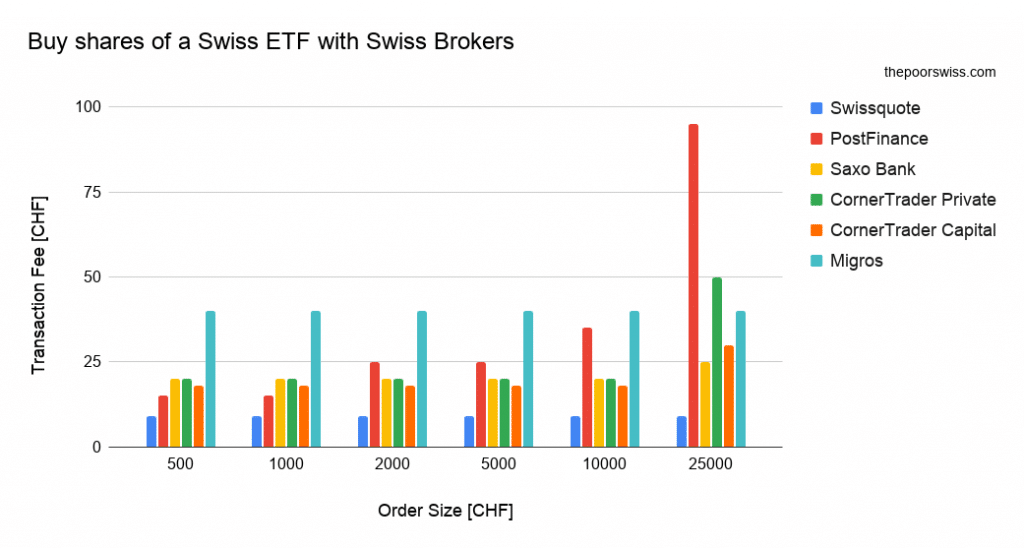
The cheapest broker to buy Swiss ETFs is Swissquote. Since they have a flat rate of 9 CHF, they are significantly cheaper than all the other brokers with higher minimums. The other ones are relatively comparable. Migros Bank is quite expensive for operations up to 25’000 CHF. After this, it is becoming relatively okay. And PostFinance is good for small operations but pretty bad for large operations.
We can do the same exercise with European ETFs. A Swiss investor that wants to diversify globally will need to invest in European ETFs. There are much more ETFs on the European Stock Exchanges than there are on the Swiss Stock Exchange.
For this example, I am going to take Euronext Paris as an example. The fees are slightly different for some brokers based on which European Stock Exchange is being used.
Here are the fees for ETFs on the Euronext Stock Exchange:
- Swissquote: From 25 EUR to 190 EUR based on the order size
- PostFinance: From 25 EUR to 350 EUR based on the order size
- Saxo Bank: 0.10% with a minimum of 10 EUR
- CornerTrader Private: 0.25% with a minimum of 25 EUR
- CornerTrader Capital: 0.20% with a minimum of 20 EUR
- Migros Bank: 40 EUR
Here are fees for one buy operation of a European ETF with different order sizes:
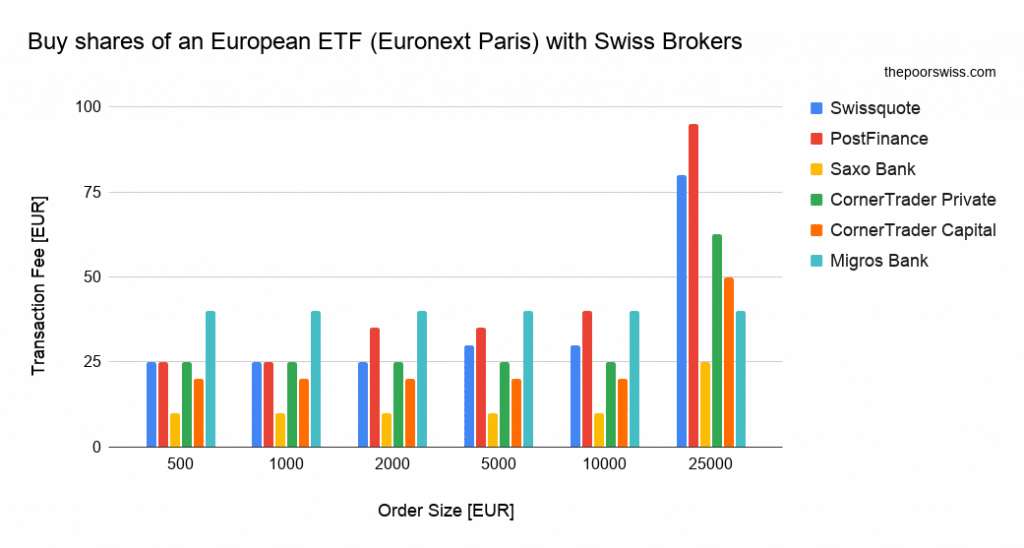
For this case, Saxo is significantly better than the others. With a minimum of only 10 EUR, Saxo Bank is quite interesting for trading European ETFs. All the others are relatively expensive in this case. After Saxo bank, the second cheapest Swiss broker is CornerTrader with its Capital account.
The last fee we are going to look at is the fee to buy shares of U.S. companies. Even though this not passive investing, it is interesting to look at because many passive investors still buy some share of companies. And in general, they are buying shares of American companies. For brokers that allow buying U.S. ETFs, this will be the same fees.
Here are the fees for stocks on the NYSE:
- Swissquote: From 15 USD to 190 USD based on the order size
- PostFinance: From 25 USD to 350 USD based on the order size
- Saxo Bank: 2 cents per share with a minimum of 20 USD
- CornerTrader Private: 4 cents per share with a minimum of 25 USD
- CornerTrader Capital: 2 cents per share with a minimum of 12 USD
- Migros Bank: 40 USD
Here are fees for one buy operation of a U.S. stock with different order sizes:
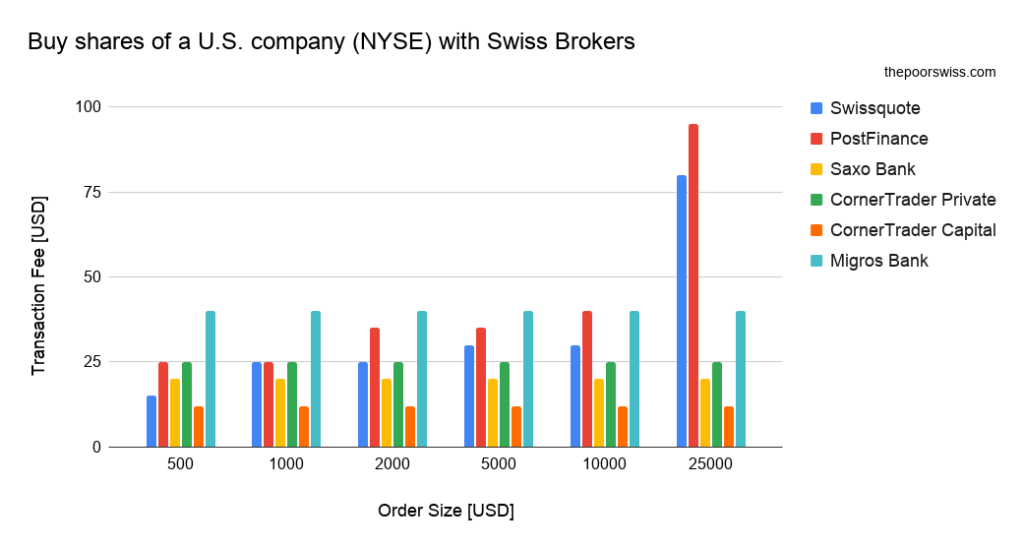
This time, CornerTrader is the cheapest broker. Since they have a low minimum of 12 USD, they are significantly cheaper than the others. For large operations, both Swissquote and PostFinance are pretty bad in this situation. Just after CornerTrader, Saxo Bank is quite cheap as well.
It is interesting to note that for each of these three operations (Swiss, EU, and the US), the cheapest broker was different!
Currency Exchange Fees
Finally, before moving into the different scenarios, we need to look into the currency exchange fees. If you want to buy an ETF in EUR, you will need to convert your CHF to EUR.
Here are the currency conversion fees of these five brokers:
- Swissquote: 0.95%
- PostFinance: 1.2%
- Saxo Bank: 1%
- CornerTrader: 0.5% with a minimum of 10 CHF
- Migros Bank: 1%
These fees are the same for CHF to USD and CHF to EUR. If you use more minor currencies, you may have to pay higher fees. But these fees are all significant already!
Here are the fees for one conversion from CHF to USD for different order sizes:
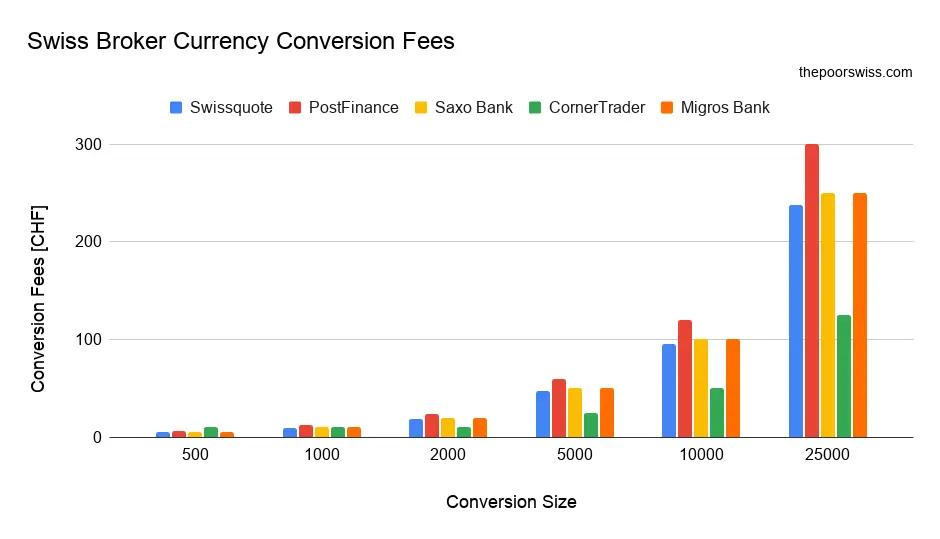
On this graph, it is fairly easy to make a simple conclusion: CornerTrader has a fair price, and all the others are much more expensive. Even with a minimum of 10 CHF, the 0.5% fee compared to the average 1% of the other Swiss brokers makes CornerTrader the only good Swiss broker for currency conversion.
Scenario 1: One Swiss ETF per month
Until now, we have only considered a single operation in isolation. But it is much more interesting to look at everything together. For this, we need to look at an entire year of trading with transaction fees and custody fees together.
One first scenario is for an investor that buys shares of one Swiss ETF (in CHF) per month. Many Swiss investors are only using the Swiss Stock Exchange. Since we need to take the custody fee into account, we need to run the scenario with several portfolio sizes. Also, since the prices are changing based on the order size, we need to choose an order size. For this scenario, the investor is buying 2000 CHF worth of shares every month. 2000 CHF is a good average for monthly investing.
So without further ado, let’s take a look at the fees of each of these brokers for one year for this scenario:
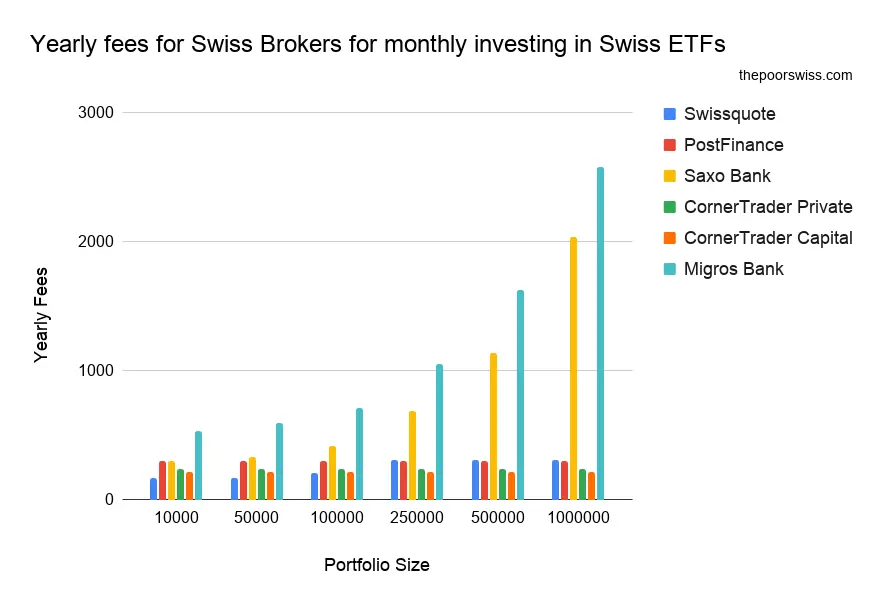
We can directly see that Swiss Investors should entirely ignore both Migros Bank and Saxo Bank. Their custody fees are too high for any serious investor. So, let’s see this graph again with the reasonable brokers:
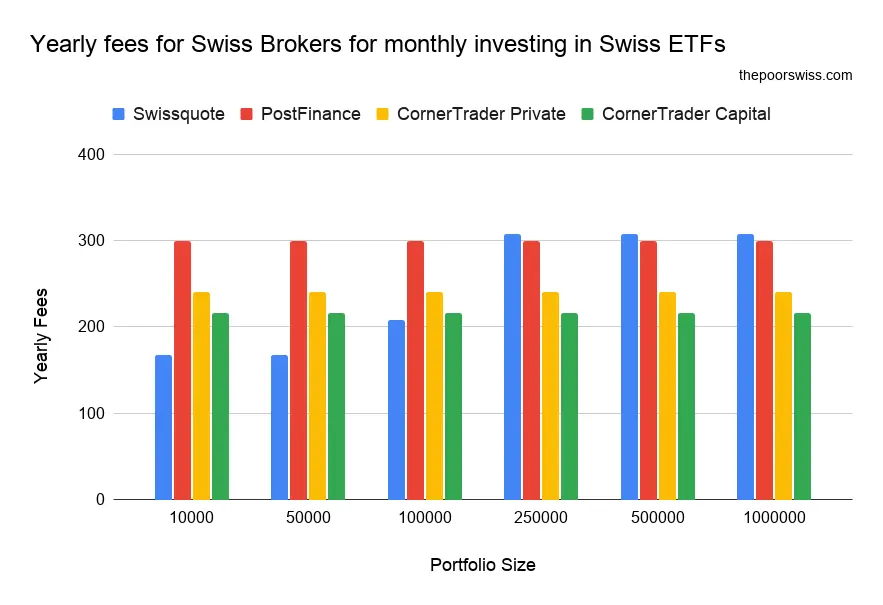
That looks better already. There is not much difference between these brokers. PostFinance is the most expensive overall. Swissquote is quite good for small portfolios, but CornerTrader is better for large portfolios because of the lower custody fees.
So, overall, in this scenario, I would use either Swissquote or CornerTrader.
Scenario 2: One European ETF per month
Now, a more interesting scenario would be to invest in ETFs on the European Stock Exchanges. Again, we are going to look at one entire year of trading.
For this scenario, we will use a monthly investment of 2000 EUR in European ETFs. And again, since custody fees are a thing, we will use different portfolio sizes.
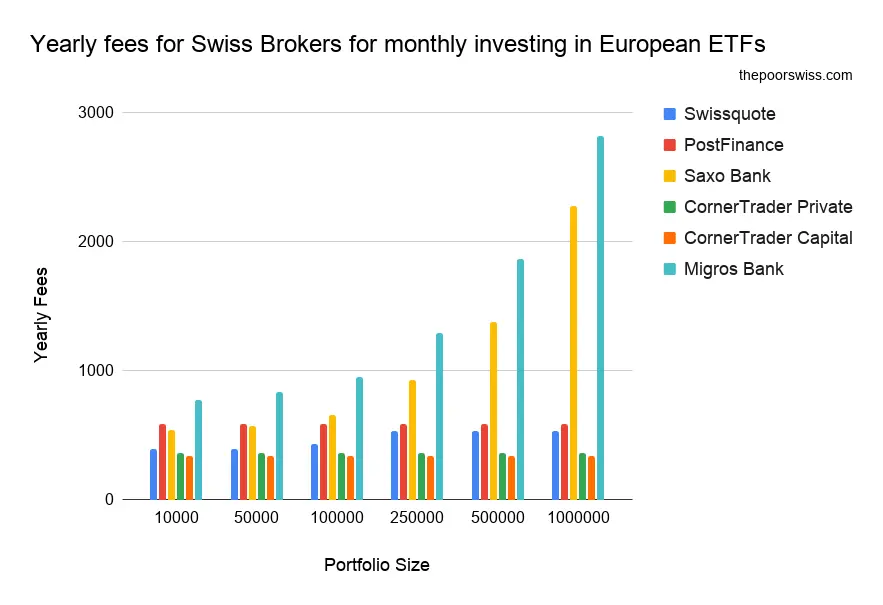
As expected, the two brokers with bad custody fees need to be ignored again. So, here is the graph again without them:
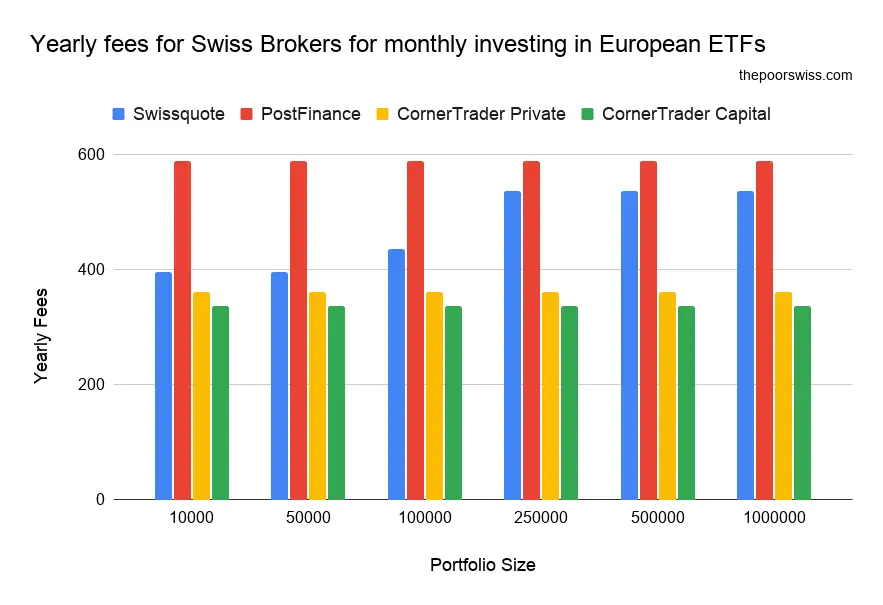
We can see that when adding currency conversion fees into the scenario, the results are a little different, and everything is more expensive. With this, I would definitely not recommend PostFinance anymore because of its bad currency conversion fee. Swissquote is okay for small portfolios but not necessarily good for large portfolios, where CornerTrader is the best choice.
Scenario 3: Withdraw once a year
For our last scenario, let’s take something different. The other two scenarios would represent an investor during the accumulation phase. Now, we can take a scenario that would represent the retirement phase.
If you want to retire based on your portfolio, you will need to sell shares to live from it. So, our scenario investor is selling for 60’000 CHF every year to live from his portfolio. Since custody fees are going to play into this scenario, we need different portfolio sizes.
First, let’s start with an investor selling for 60’000 CHF of a Swiss ETF at the beginning of the year:
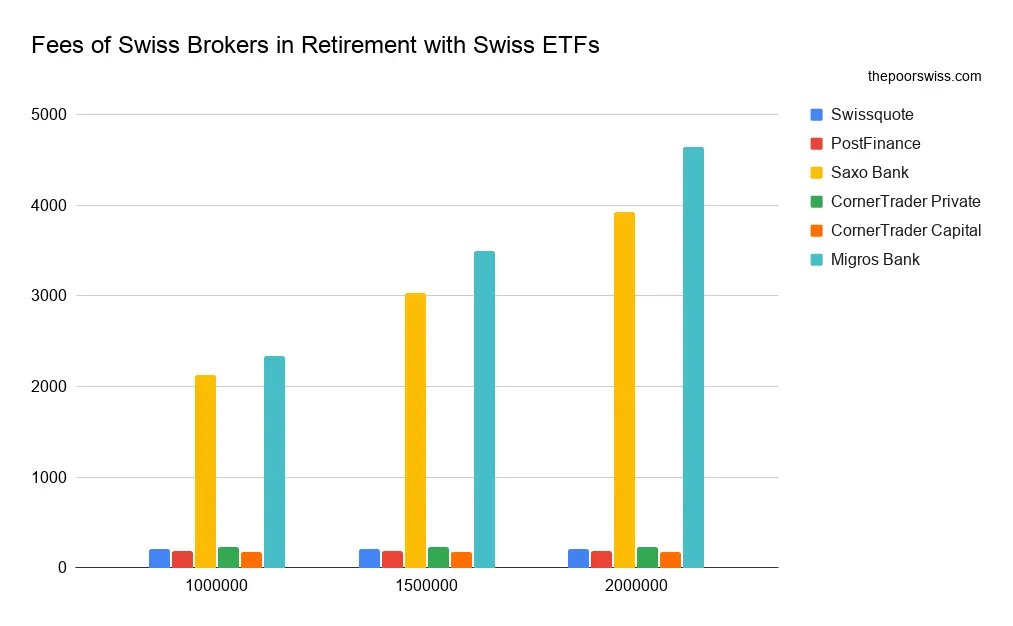
This is where we can see the impact of high custody fees. In retirement, you have no income, and you could be giving your broker several thousand Swiss francs per year! I would not recommend anyone to invest with such a broker! You need to find a broker with which the custody fee has maximum.
Let’s see the other four choices:
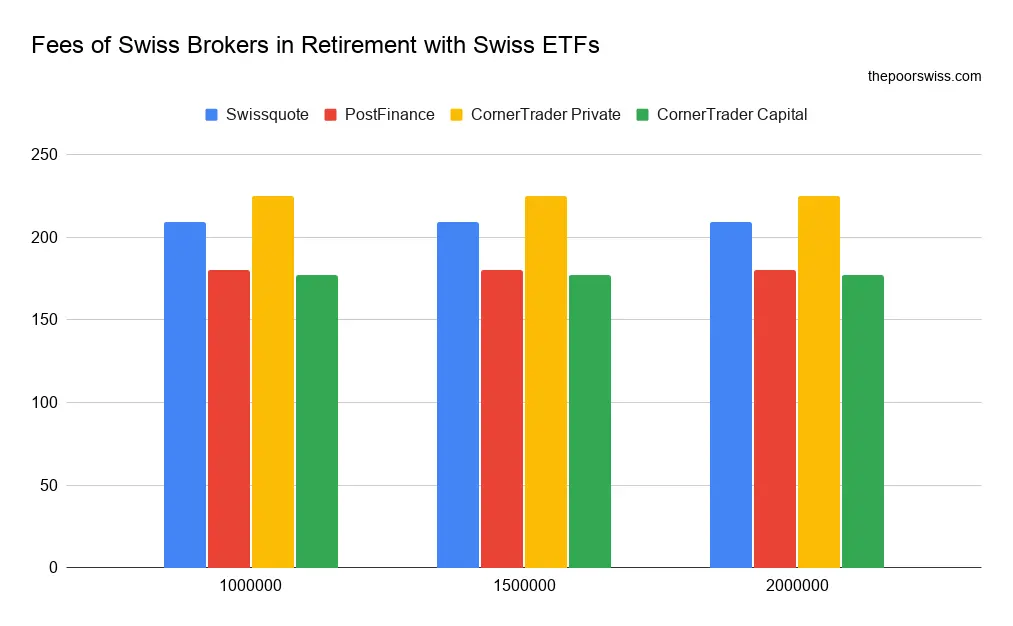
This time, there is barely any difference between the brokers. There is a 50 CHF per year difference here between the cheapest and the most expensive one. This does not matter.
To avoid inactivity fees, we can also withdraw money each month. This also has the advantage of keeping your money investing longer. If the money is withdrawn each month instead, the results are still very similar:
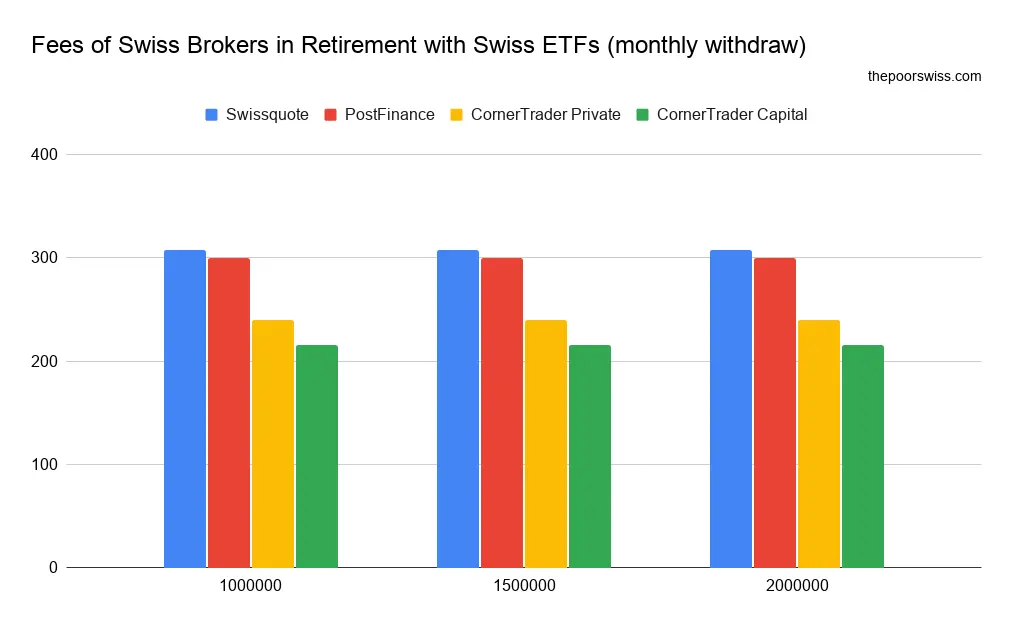
The differences are slightly higher here. But 100 CHF per year is not a huge difference. Nevertheless, CornerTrader is the cheapest option once again.
Some people will argue that selling each quarter would be optimal to avoid the inactivity fees and large transaction fees. But I would argue that this is a meaningless optimization. It will make very little difference whatsoever. You should withdraw either once a year or once a month. Ideally, once a month will have better returns in the long-term since you keep the money in the market as long as possible. But of course, there are other things to take into account.
Finally, we can see what happens when we sell shares of ETFs on the European stock exchange instead of on the Swiss Stock Exchange. Here are the results with our three cheap Swiss brokers:
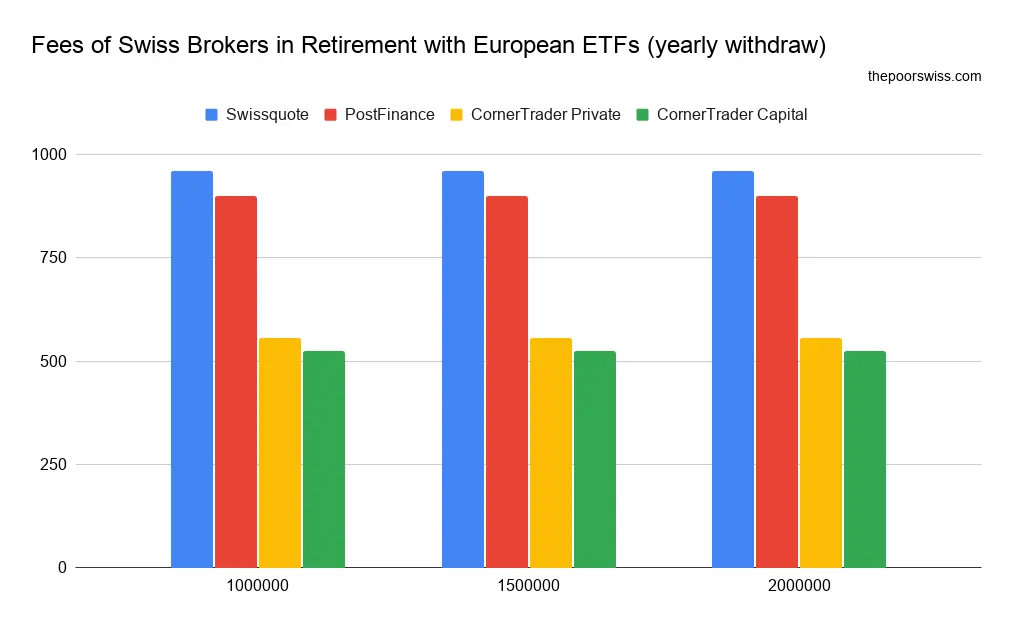
This time, the difference is more significant due to currency conversion fees. This is where CornerTrader gets better than the others due to being twice cheaper at converting currencies.
In that scenario, I would only use CornerTrader.
Conclusion
Swiss brokers are expensive, but you can find some brokers cheaper than others if you search well. If you want a Swiss broker, I would recommend either:
- CornerTrader if you are going to buy any ETFs that are not in CHF.
- Swissquote if you are only going to buy ETFs in CHF.
These are the only two decent choices, in my opinion. This is what I would choose if I were to use a Swiss broker.
One another important conclusion from this article is that Serious investors should never use a broker with a custody fee without a maximum. This becomes very quickly too expensive. For this reason, I would never recommend using either Saxo Bank or Migros Bank. They are way too expensive and will drag your returns down. And some Swiss brokers are even more expensive than these two. So, Swiss investors should be careful.
Now, do I recommend people to use a Swiss broker? Not really. Just because CornerTrader is cheaper than other Swiss brokers does not make it cheap. All these brokers are expensive and limit you in what you can invest in. So, I still recommend investing with Interactive Brokers that is cheaper. Also, using foreign brokers lets you save on the stamp duty tax.
However, if you are afraid of having your money outside of Switzerland, it is much better to use a Swiss broker than not to invest at all! And since this was requested from me so often, I feel like I had to write this article. I hope that cheaper brokers will come in the future.
If you think investing fees can be taken lightly, you should read my article about investing fees and their impact.
What is your favorite Swiss broker?
